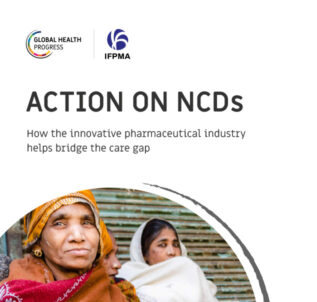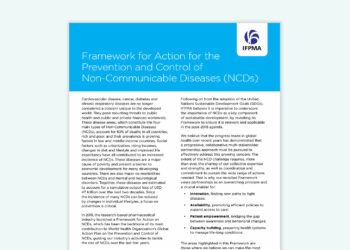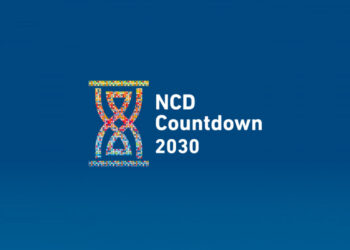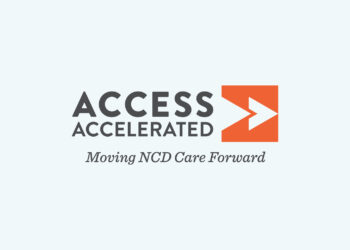Non-communicable diseases


IFPMA helps tackle NCDs by building multi-sectoral alliances and reinforcing the importance of investing in NCD prevention and care through our policy and advocacy work.
Overview
Each year, 17 million people under the age of 70 die of NCDs globally, and 86% of these deaths take place in low- and middle-income countries (LMICs).
Social factors such as urbanization, changes in diet, and lifestyle have all contributed to an increased incidence of NCDs.
But the Sustainable Development Goal (SDG) on Good Health and Well-Being targets a one-third reduction in premature NCD deaths by 2030 (SDG 3.4).
This can only be achieved through timely, sufficient, and sustainable investments in strengthening primary health care systems and tackling social and environmental issues that contribute to the growing burden of NCDs.
of all deaths caused by NCDs
people between ages 30 and 69 die each year from NCDs
of all NCD deaths are in LMICs

Action on NCDs: How the innovative pharmaceutical industry helps bridge the care gap
In the spirit of the Global Week for Action on NCDs, this report reiterates the long-standing commitment of the innovative pharmaceutical industry to bring innovative solutions, bridge the NCDs care gap, and accelerate Universal Health Coverage (UHC) and the 2030 Sustainable Development Goals (SDGs).
Read moreReducing premature mortality
Enabling people to live longer and healthier lives is fundamental to progress in global health.
R&D on the part of the innovative pharmaceutical industry helps reduce premature mortality from NCDs. It provides new treatments, supports prevention measures, and improves the quality of care.
Through partnerships and collaborations such as Access Accelerated, we drive different activities in LMICs that contribute toward a shared goal of reducing NCD deaths globally.
This spans capacity building, promoting health literacy, fostering patient empowerment, strengthening health systems in low-resource areas, and working on pricing and affordability solutions to make medicines more accessible to the global population.

Framework for action on NCDs
Launched in 2011 and revised in 2015, recognizes the contribution of the innovative pharmaceutical industry toward preventing and controlling NCDs.
Read more
NCD Countdown
NCD Countdown 2030 is an independent collaboration to inform policies that aim to reduce the worldwide burden of NCDs, and to ensure accountability.
Read more
Access Accelerated
Access Accelerated is driving unprecedented collaboration to advance global progress on NCDs for those who need it most.
Read moreCancer
Around 3,148 cancer medicines are currently being developed through the innovative pharmaceutical industry’s continued R&D.
deaths in 2020 were due to cancer, with 70% in LMICs
children and adolescents of 0-19 years old develop cancer
cancer medicines are currently in development
Managing cancer globally for the future
In the past 50 years, understanding of cancer has advanced considerably, leading to new and more effective treatments.
The innovative pharmaceutical industry is dedicated to improving global cancer management based on more effective partnerships and collaborative approaches to providing access to healthcare.
For instance, it plays a key role in integrated care, where organizations partner to deliver services that best serve populations.
Where the burden of cancer and its economic impact are growing worldwide, companies work constantly to adapt R&D and models to improve access to innovative treatments.
Looking to the future, the innovative pharmaceutical industry believes that capacity to strengthen health literacy and healthcare workforce must be increased. To address existing health inequities and gaps in cancer care management, palliative care also needs to become more efficient.
Cancer registries
As part of the Global Monitoring Framework on NCDs, World Health Organization (WHO) member states have committed to reporting cancer incidences in the 2025 mortality target.
To support this, we encourage the use of cancer registries that are designed to advance clinical research, better understand cancer trends, and develop a more targeted and efficient approach to prevention, diagnosis, and treatment.
Multisectoral partnerships
Since the early days of the Millennium Development Goals (MDGs) – replaced by the SDGs in 2015 – the innovative pharmaceutical industry has partnered with governments, health providers, and civil society.
Industry contributes to the SDGs by exploring new ways to engage in multisectoral partnerships to improve access to innovation in LMICs.
These include:
IFPMA is an active member of the Access to Oncology Medicines (ATOM) Coalition. ATOM is an innovative global partnership launched by the Union for International Cancer Control (UICC) and other partners to address issues of access to essential cancer medicines, specifically in LMICs.
The Global Coalition on Cancer Diagnostics is a coordinated effort between the industry, civil society, governments, and healthcare institutions. It supports health system strengthening and addresses issues regarding access to quality and timely diagnosis of cancer in low-resource settings.
Led by the WHO, this global effort aims to reduce breast cancer mortality incidences and save approximately 2.5 million lives.
Launched in 2018 by the WHO, this initiative brings together various stakeholders who aim to increase childhood cancer survival rates by 60% by 2030.
This collaboration promotes comprehensive cancer care by leveraging public-private partnerships and focusing on raising awareness, capacity building, and resource mobilization.
Diabetes
In the 100 years since diabetes was discovered, the innovative pharmaceutical industry has helped pioneer new treatments, delivery mechanisms, and blood glucose monitoring devices.
These have reduced side effects and long-term complications and improved quality of life for people living with the condition.
More than 450 medicines are currently in development.
million adults (20-79 years) live with diabetes
people with diabetes live in LMICs
diabetes medicines are currently in development
Together against diabetes
IFPMA and our member companies work with a range of stakeholders to ensure that people all over the world have access to the set of health products required for managing diabetes.
We collaborate with governments, civil society, heath providers, and private stakeholders to scale up successful existing initiatives and explore new collaborative models.
IFPMA is committed to the WHO Global Diabetes Compact, launched in April 2021.The Compact unites key players across all public and private sectors, including people living with diabetes, to shape a common agenda and drive action toward improved solutions for diabetes treatment and care in LMICs.
Among our member companies, 34 are taking part in 53 collaborations in diabetes. These focus on prevention, timely testing and diagnosis, access to medicines, and patient management and support.
Diabetes CarePak
IFPMA supports Diabetes CarePak to improve access to safe insulin administration and self-care in Kenya.
Diabetes CarePak is expanding to other African countries such as Tanzania, Mali, and Mozambique. By bundling elements of treatment and care for people living with diabetes, CarePak improves affordability and accessibility for better diabetes control.
Cardiovascular disease
The innovative pharmaceutical industry is constantly developing new ways of treating cardiovascular disease (CVD) related to the heart and circulation.
Over the years, scientists have discovered more about the interplay of various genetic, environmental, and lifestyle factors affecting CVD. This knowledge has allowed the innovative pharmaceutical industry to develop a range of effective treatments.
Despite this remarkable progress, CVD remains the leading cause of death worldwide, and hypertension is one of the major underlying risks.
In LMICs, IFPMA supports more integrated care and multipronged action plans to prevent, diagnose, manage, and care for CVD. This holistic model includes addressing related conditions such as hypertension and diabetes.
According to the WHO:
CVD are the leading cause of death worldwide
deaths every year are due to CVD
of CVD deaths take place in LMICs
The WHO Private Sector Dialogue on hypertension
IFPMA and our innovative pharmaceutical company members actively took part in the Private Sector Dialogue on hypertension convened by the WHO in June 2022.
This dialogue was part of a series on NCDs that aims to support countries in health system strengthening and addressing issues of access to medicines, diagnostics, and care, especially in LMICs.
Action on NCDs
Through concerted and collaborative action to address NCDs, the global health community, including the innovative pharmaceutical industry, can contribute to global health progress, improve lives, and regain the momentum we need for action on NCDs.






